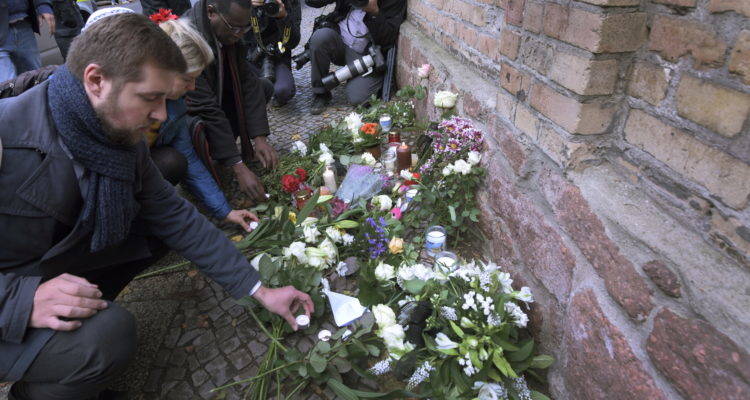I choose to believe that the vast majority of German Catholics are not anti-Semitic and support the right of Jews residing in Germany to live without fear for their personal safety.
By Henry Roth
With the Vatican agreeing earlier this year to allow historians unfettered access to the Church’s wartime archives, hopefully we will soon have an answer to the question of Pope Pius XII’s degree of culpability in the Holocaust.
While we wait for the scholars to determine what the Vatican did or did not do during the War, one thing we know is that many German Catholics were only too happy to embrace the Nazi movement and all that it embodied, including the ‘Final Solution of the Jewish Problem’.
Yes, there were individual churches, monasteries and convents in Germany and German-occupied territories that sheltered Jews during the war, but they constituted a microscopically tiny percentage of Catholic institutions. The indisputable fact is that the Nazi war machine could not have existed without the active participation of the majority of German Catholics.
That is not to say that Catholics who played a part in the war effort were following the Church’s principles or dictates; nowhere in the Bible were such acts of brutality and depravity proposed or sanctioned. However, it is true is that Catholics managed to participate in the most inhumane and barbaric practices without feeling any Church- or faith-imposed constraints.
It’s now 2019 and the situation in Germany, and more specifically, the relationship between the Jewish community in Germany and their Catholic countrymen, is again an issue of some importance. Jews in Germany are victims of a level of anti-Semitic attacks and incidents not seen in 75 years. Some of the culprits are Islamists, but many are old-stock Germans, such as the perpetrator behind the recent attack on the synagogue in Halle that left two dead. Given the inability and/or unwillingness of German Catholics to come to the aid of their Jewish neighbors during the War, one can only hope that they wouldn’t wish for history to repeat itself.
I choose to believe that the vast majority of German Catholics are not anti-Semitic and support the right of Jews residing in Germany to live without fear for their personal safety. This faith in German goodwill leads me to conclude that they would be prepared to take concrete measures to ensure the safety and well-being of the Jews in their midst.
Starting with Security
Thus, I make this appeal directly to German Catholics. Do what your wartime ancestors failed to do: protect your fellow citizens who happen to be Jewish. Here’s how that objective can be realized.
First, start with the security of Jewish institutions, such as schools and synagogues. Sadly, the German government has determined that ‘minor’ facilities such as the synagogue in Halle do not merit any special police protection. Yet the Jewish community, on its own, does not have the resources to pay for the security manpower required to guard these facilities year-round. I would propose that the Catholic Church ask its members to take up the task of guarding Jewish institutions.
There are nearly 25 million Catholics in German,y so surely there are a couple of thousand willing to spend a few hours a week ensuring the security of their 275,000 Jewish neighbours. They wouldn’t even need to be armed, just need to be present to act as a deterrent and to contact authorities if/when required. Not that it would be a bad idea for one or two armed police officers or military members to be present to augment the civilians’ efforts.
The Church could also take a much more assertive role in educating their members about the Holocaust, since the German public education system has proven itself wholly inadequate for the task (nearly 40% of German youth have no knowledge of the Holocaust according to a recent survey). I would propose that Holocaust studies be part of the Sunday School curricula for Catholic children, and adult classes could be offered (mandatory attendance perhaps?) to ensure the grown-ups are also educated on the faith-related lessons of Germany’s wartime atrocities.
Vilification of Israel
The Church could also play an important part in ending, or at least reducing, the vilification of Israel in Germany.
That a Germany only a couple of generations removed from the Holocaust could vote consistently against Israel in the United Nations is both inexplicable and appalling. The Church could teach the true history of Zionism, about the Jews’ thousands-of-years presence in the land of Israel, about their repeated (and rebuffed) offers of a two-state solution to the Palestinians, about Israel’s ‘occupation’ being the outcome of wars initiated by Israel’s neighbours, about Israel’s role as the refuge-of-last-choice for Jews besieged and threatened elsewhere. (Perhaps the Church might even point out how many Jews might have survived the War had Israel existed in 1939).
I would also suggest the German Catholic Church make it crystal-clear to their members that acts of anti-Semitism are an affront to God and in conflict with the Church’s principles. Perhaps there should even be the threat of excommunication for those Catholics who are guilty of overt acts of anti-Semitism.
I’m sure that if a Synod of German bishops were convened to discuss the issue of historical Catholic anti-Semitism and the current hardships and threats confronting the Jewish community, they would be able to formulate additional measures to provide meaningful support to their Jewish brethren. This is what history and decency demand.
